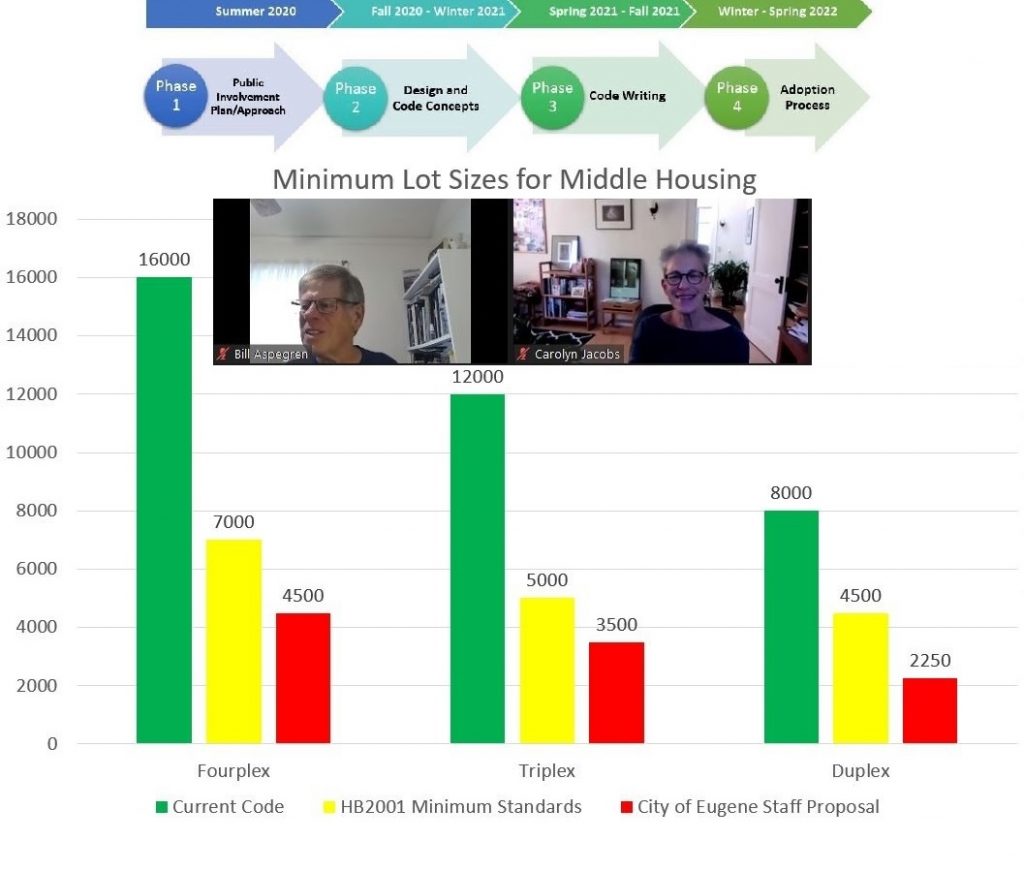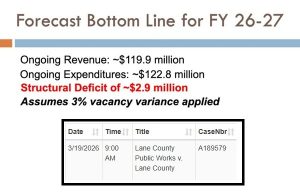SUNA: City’s HB2001 plan will accelerate loss of low-income housing, displace residents
7 min read
The City's good intentions could accelerate gentrification, neighborhood land-use advocates warned.
Bill Aspegren: I’m Bill Aspegren and my partner in crime is Carolyn Jacobs. Just a quick introduction. We’ve both been working on land use issues since about 2007.
Long-time board members from the South University neighborhood shared the latest news on HB 2001.
Carolyn Jacobs: [00:00:19] In our current code, a fourplex requires 16,000 square feet to build it. The minimum code that HB 2001 requires has cut it down to 7,000—pretty extreme—but what staff is proposing is 4,500. You could now build four units on the same size lot that is required today to build one single family house, 4,500 square feet. That’s the minimum today to build a new single family house. You would be able to put four houses on it.
Bill Aspegren: [00:00:59] Let me talk about building heights for a minute. Building height for a single-family home is 30 feet plus a seven foot pitched roof, so it’s 37 feet. Okay. They’re proposing to raise that to 35 feet plus a seven-foot pitched roof. And you say five feet, big deal. Actually, it is a big deal, because that five feet means you can easily build a three-story building there.
The concern that we have is that the staff has proposed changes that really go beyond the minimum standards considerably. Even though we can get a lot more middle housing out of those standards, they’ve gone beyond and some of them are pretty extreme, okay?
Thank you for supporting
local civic journalism
Carolyn Jacobs: [00:01:43] What’s scary is the extreme difference. If a duplex now requires a minimum of 8,000 foot lot, it will require only 2,250, and you can put two houses, you can call it a duplex, but the minute they play with the language, which is what a lot of what this is about, they play with language.
If it’s detached, which, I don’t know about your dictionary, but my dictionary and the City Code right now, call a plex, a building, right? A duplex, triplex, fourplex is a building, but the minute we mess with the definition and the language, anything’s possible. So instead of saying, ‘There has to be a duplex’, or ‘There can be duplexes on every single lot,’ what we’re talking about is two houses on any single lot.
I think what’s happened with messing with the definitions, is, ADUs will not really exist anymore. And neither will really duplexes, triplexes and fourplexes. I think what you’ll see is that the term ‘middle housing’ has come full circle to be single houses on very little lots. Anyways, that’s a lot of what actually I was thinking about and wanting to stress, is this change in the definitions, because it helps move a certain kind of land use forward.
Bill Aspegren: [00:03:11] Density really doesn’t matter anymore. And the staff has said, we’re going to let lot size determine density.
John Q: [00:03:17] They presented to the Southeast Neighbors board and City Council Member Matt Keating.
Council Member Matt Keating: [00:03:23] Bill, Carolyn, thanks for the the presentation and you make some compelling arguments. Bill, you’ve posed a question and I think Carolyn touched on it slightly, but could you dive into the question you posed a little deeper? You asked: Why is detaching problematic?
Bill Aspegren: [00:03:42] Why is it problematic? Because I believe it gets into the lot splitting and how (Senate Bill) 458 will be handled. I would really like to know a lot more about that. I’ve read the legislation and I know what it says, but I just am having trouble visualizing how it’s going to be implemented.
To me, when you split it apart, it’s a single family home. And quite honestly, I think that was a mistake for the legislation to allow that, because I think it’s an area for challenge and we don’t want to do that. We don’t want to get into that kind of a thing because, as you’ve seen in the ADU stuff, it just goes on forever. …I think allowing detached plexes doesn’t make sense when you have other options within the legislation to do it.
Carolyn Jacobs: [00:04:28] if you can even accept the term ” detached plex” or “plexes”, how can they be anything other than a single-family house or a single housing unit?
And if they’re a single-family house, then presumably they should have to live with the same standards that we have in place for single-family houses, which includes, you know, an enormous range of stuff, but I just can’t fathom how we could sit here and talk about a detached unit and not see that it’s a single-family house. What are you going to do with them in terms of standards, will they be single-family house standards? And if not, why not?
Council Member Matt Keating: [00:05:12] But if those front yards or an a driveway, the parking requirements were out the window and that lot was turned into, a duplex or triplex, and there were multiple families that were able to buy in at a far more affordable price point, wouldn’t that be a net benefit to help solve the housing crisis. And wouldn’t the lack of parking be better framed as an opportunity to lift up our robust public transportation system in a time when we need to transition from fossil fuels to either electric vehicles or to, better promoting our already existing world-class transportation line. …I don’t think that we can still hold onto an antiquated model of front yards and a parking lot, a parking space in a garage guaranteed for every resident.
Carolyn Jacobs: [00:06:05] No onsite parking basically flies in the face of all of our climate change things, because how will we transition? How would anybody transition to an electric vehicle? If they have no onsite place, they have no ability to charge it. So I think that’s a real dilemma in the thinking about electric vehicles, if you can’t charge them where you live.
And the other problem right now is that most of our neighborhoods are not served by any public transportation. So the people who buy into these plexes, I mean, hopefully, maybe more of them will be bikers or maybe they’ll be near where they work, but people are going to have to have cars because there isn’t through our neighborhoods, much public transportation. And so if you’re going to have a car, you’d like to think that we were moving towards electric vehicles. And it worries me that we may be ruling that out for a lot of people.
Bill Aspegren: [00:07:02] A deficiency I think in the legislation is, it doesn’t tell you where middle housing can be built. Okay. And so that means developers are going to put it where they can make the most money. And that may not be along transit lines.
Carolyn Jacobs: [00:07:16] There will certainly be quite a level of displacement because, as Bill sort of suggested, if you’re a developer investor, your goal is profit, you will buy the least expensive property, usually because it has, well, the property value is low, mostly because it has an unmaintained and older whatever kind of house it’s affordable housing for somebody now, right? I mean, it’s a less expensive property. It’s probably has a lower rent or value. So those are the properties that are going to disappear first. And what will be built in their place will be more expensive. They just will. The cost of building is very expensive. So. Where are these people going? I mean, we are going to push out the people at that bottom, not people who have no income, they’re not even living in those houses, but people with a low income for whom it works. Now, those people are gone and we’re building nothing for the people who will be displaced. I find that really troubling.
Bill Aspegren: [00:08:25] I do think that the problems, potential problems with displacement, call it gentrification, whatever you want, I think that’s, that’s probably pretty real. There aren’t a lot of vacant lots that we can get to build this stuff on. You’re going to have to find a cheap house, scrape it, build it. And, uh, somebody’s going to lose the house that they can afford now. And I don’t know where they all are going to go, basically.
Carolyn Jacobs: [00:08:52] if you really care about climate change, these small houses on very small, small lots, there will be no room for trees. You will lose trees and there will be no place to put them. There’s nowhere for trees. There’s also no room for a garden. There will be no, room for kids to play.
Council Member Matt Keating: [00:09:09] Don’t get me started on the amount of trees that are being cut down in our woefully sad tree canopy coverage at 21%, maybe there’s something that council can do.
…I really want to hone in on something that I’ve heard everyone here say and Councilor Zelenka and Rep. Wilde and I last week were talking about it. What guard rails can the city put in place so our lower-income residents aren’t displaced? Maybe there’s something we can do to lessen the burden on those who are potentially displaced.
John Q: [00:09:43] The city continues the “code writing” phase through the fall for House Bill 2001.




